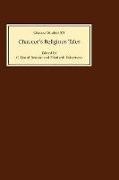Read more
Most of Chaucers tales are religious in some sense, but these four works deal specifically and deeply with faith and spiritual transcendence. They appeal to qualities, such as Pathos, yet at the same time they seem extraordinarily comtemporary in their special interest in women and feminist issues. The neglect of Chaucers religious tales reflects a faded 19th-century humanism, but it is appropriate to recognize their importance in his canon, for Chaucer is a religious poet as much as he is a poet of comedy and secular love. These essays survey past criticism on the religious tales and offer new approaches. Without condescension or pietism, they recognize the artistic and thematic power of the poems under consideration.
List of contents
Part 1 General Esays: Chaucer's religious tales - a question of genre, Derek Pearsall; Chaucer's tales of transcendence - rhyme royal and Christian prayer in the "Canterbury Tales", Barbara Nolan; pathos in Chaucer's religious tales, Robert Worth Frank Jr. Part 2 Reception: the Protestant Chaucer, Linda Georgianna; critical approaches to the "Clerk's Tale", Charlotte C. Morse; critical approaches to the "Man of Law's Tale", A.S.G. Edwards; critical approaches to the "Prioress's Tale" and the "Second Nun's Tale", Carolyn Collette. Part 3 Essays in criticism: nominalism and the dynamics of the "Clerk's Tale" - "Homo Viator" as woman, Elizabeth D. Kirk; the spiritual heroism of Chaucer's custance, George R. Keiser; poetic variety in the "Man of Law's Tale" and the "Clerk's Tale", C. David Benson; aspects of female piety in the "Prioress's Tale", Elizabeth Robertson; the "Second Nun's Tale", John C. Hirsh; patterns of feminine and masculine persuasion in the "Melibee" and the "Parson's Tale", Jane Cowgill.

